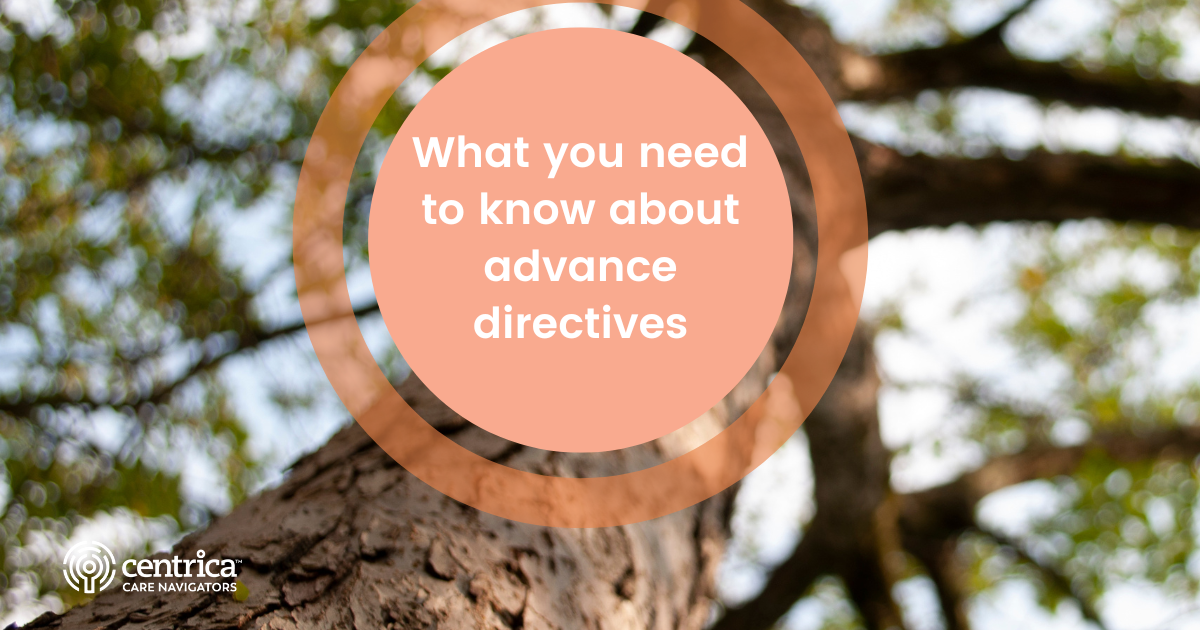There’s a lot to consider when you’re thinking about what might happen if you’re seriously injured or diagnosed with a fatal disease. For one thing, you may not want to think about it at all. When you do, though, you also have to think about who your next-of-kin is, and if you have a will in place, and funeral arrangements.
Are your advance directives ready too?
Advance directives are instructions on who you’re naming to make decisions on your behalf if you are incapable of deciding for yourself, like when you are in a coma. This person is sometimes called your medical power of attorney, but we use the term patient advocate to make it clear that these directives are related to your medical concerns, not your legal ones.
By signing advance directives paperwork, and making sure everyone close to you knows about it, you give your patient advocate the ability to follow through on your wishes, like:
- Do you want to use ventilators, nutritional tubes, and other machines to keep you alive if needed?
- Can you refuse treatments and choose to die, or do you want to be kept alive for as long as possible?
Those are some of the most significant questions you need to be clear about in your advance directives. The form we use here at Centrica Care Navigators includes a lot of optional information beyond that, though, including things like:
- Mental health care;
- If you want an autopsy;
- How you want to be buried or cremated; and even
- Which songs you want played at your funeral
Why are you thinking about music when you’re making advance directives? Your advance directives are a place you can record everything that’s important to you in your end-of-life planning, including funeral arrangements. It is optional; the main goal of writing advance directives is to be clear about your medical decisions for yourself.
What about my will?
A will describes what should happen to your beneficiaries (children) and possessions after your death. Advance directives, on the other hand, are what should happen to you if you’re still alive but incapable of making decisions for yourself. They may have some similar information, but they’re not the same.
A living will is similar to the broader, more comprehensive advance directives. It describes the medical treatments, procedures, and medications you do or don’t want to receive if you are incapacitated. But a living will is focused on medical treatment when you are terminally ill, and not what should happen if you fall into a coma, have dementia, or something similar.
It also typically doesn’t talk about who you want as your patient advocate, or any of the other options we discuss in our Centrica Care Navigators form.
Here’s another difference: you need advance directives close at hand. A will can be stored away in a safe deposit box until it’s time to look at it. But if you’re in a terrible accident, your patient advocate should be able to grab a copy of your advance directives right away to follow your instructions.
Make sure everyone close to you has a copy in paper or saved in email – anywhere it can be easily accessed. You should have a copy too, maybe even with instructions written on a card in your wallet.
Though many people name their spouse as their patient advocate, he or she may not be the best choice. That’s because your husband or wife will probably want to do everything they can to keep you alive, even if that’s not really what you want for yourself.
Your advance directives also need to be witnessed. Once your instructions are final, you’ll sign the document along with the patient advocate you selected. You’ll also need to find two witnesses – two impartial people who don’t stand to benefit from your death.
The five Ds: revisiting your choices
The “five Ds,” milestones in your life that are good times to update your advance directives, are just as important. They are:
Decade: You will be in a very different place in your life 10 years from now.
Divorce: Major life changes may mean a different person should be your patient advocate or that you ought to identify someone else who needs to have a copy of your advance directives.
Diagnosis: If you don’t have your advance directives in place before you’re diagnosed with a life-limiting condition, you should definitely prepare them as soon as you can.
Decline: With or without a diagnosis, if there’s a serious change in your overall health, it’s a good time to revisit your advance directives.
Death: The loss of someone you love can help remind you to decide what’s most important to you… and you will also need to revise your advance directives if your patient advocate dies.
When you’re faced with one of the five Ds, take some time to read through your advance directives. Update names and make changes to your choices if you want to.
How to get started
Talking about getting your advance directives in place is a lot like talking about any preparations for end-of-life care: you just have to bring up the topic.
One way to start discussing advance directives is by talking about what didn’t go well for someone else that you know: “Remember how difficult it was when Uncle Bill got in his car accident? Here’s what I want if that happens to me… I think you should write down what you want, too.”
A serious accident or severe disease will change the lives of many people – not just the person it happens to, but their family and friends as well. Have advance directives ready long before they’re needed. In a very stressful time, having clear instructions on what to do if someone isn’t able to make their own choices can be a big relief.
You can learn more about advance directives by exploring our website or calling Centrica Care Navigators at 269.345.0273.




